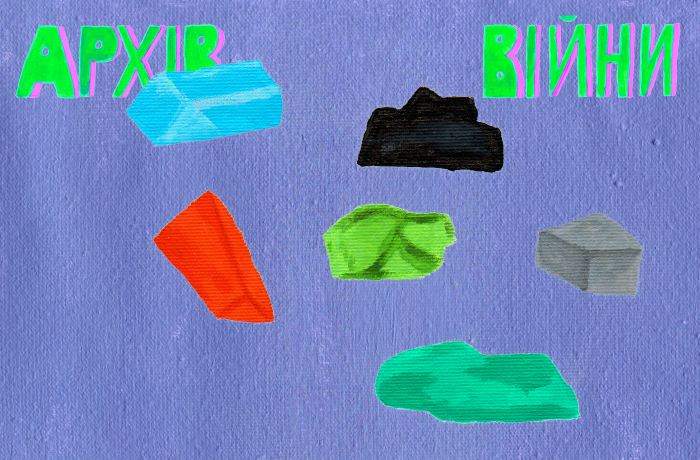
The Ukraine War Archive presents a non-competitive film programme, UKRAINE WAR ARCHIVE/EVIDENCE, at the 22nd Docudays UA. These films were created by documenters during the full-scale Russian invasion of Ukraine. They capture war crimes and are often made not by professional filmmakers, but by activists, journalists, and human rights defenders.
The programme explores the unique intersection between human rights and documentary practices, creating space for dialogue between the authors and the audience. It is also a step towards uniting the community documenting war crimes and seeking new forms of collaboration.
Radio Liberty has reconstructed, minute by minute, three days in March 2022 on Yablunska Street in Bucha — a period marked by some of the most intense executions of civilians. The documentary Bucha. Yablunska brings together CCTV footage, previously unseen images of killings, classified Russian documents, and testimonies from eyewitnesses and relatives of the victims to tell the story of the Russian perpetrators and their victims.
Radio Svoboda will name the soldiers suspected of involvement in the mass killings on Yablunska Street and present evidence implicating senior Russian commanders. The film is the third instalment in journalist Dmytro Dzhulai’s investigation into the mass killings in Bucha.
Copyright (c)2025 RFE/RL, Inc. Used with the permission of Radio Free Europe/Radio Liberty
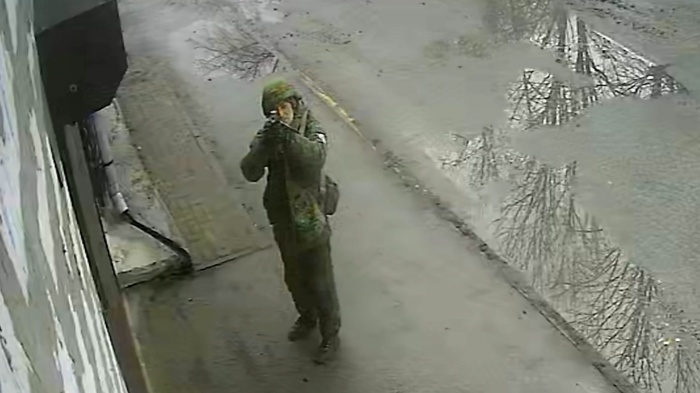
Still from Bucha. Yablunska
The airstrike on the Mariupol Drama Theatre on 16 March 2022 was one of the most shocking events of the early weeks of Russia’s full-scale invasion of Ukraine. At the time, the building was sheltering thousands of Mariupol residents during the siege of the city. The word “ДЕТИ” (“children”) had been written clearly on the ground to indicate that the theatre was not a military target. Despite this, Russian forces launched an airstrike on the building.
On 28 March 2022, Russian troops seized the city centre. Since then, the occupying authorities have been erasing and manipulating evidence of the crime. The ruins of the theatre have been turned into a backdrop for propaganda. On 22 December 2022, most of the remains of the building were demolished.
The Centre for Spatial Technologies (CST), in its film A CITY IN A THEATRE: The Russian Airstrike on the Mariupol Drama Theatre, explores the history of the theatre, its transformation into a shelter during the full-scale war, the Russian attack, and the subsequent destruction of its memory. The team collected and analysed thousands of photographs, videos, and social media posts, and recorded over 100 hours of witness interviews. Close collaboration with survivors in reconstructing their memories through a 3D model turns the investigation into an act of commemoration.
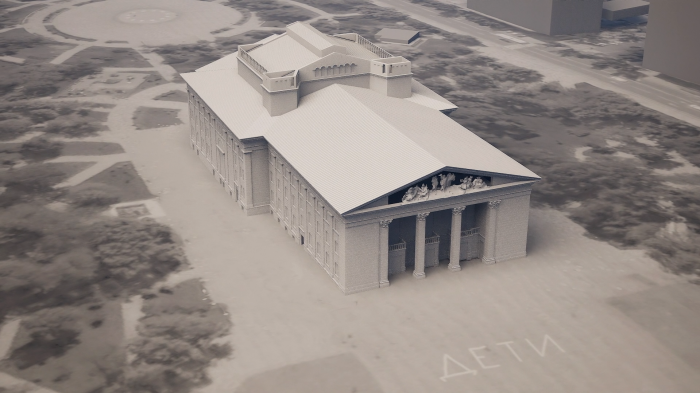
Still from A CITY IN A THEATRE: The Russian Airstrike on the Mariupol Drama Theatre
Voices of Mariupol, a film by the Kharkiv Human Rights Protection Group (KHPG), tells the stories of three Mariupol residents who survived in a city cut off from electricity and communication under relentless Russian airstrikes. Each story is unique: school graduate Mariia Vdovychenko endured brutal filtration procedures; neonatologist Hanna Shevchyk worked as a doctor in a bomb shelter; and photographer Yevhen Sosnovskyi documented the events and, risking his life, smuggled a flash drive with evidence through checkpoints so the world could learn the truth about the genocide committed by the Russians.
The film aims to convey this historic tragedy through first-hand accounts — so that it may be heard and remembered for generations to come.
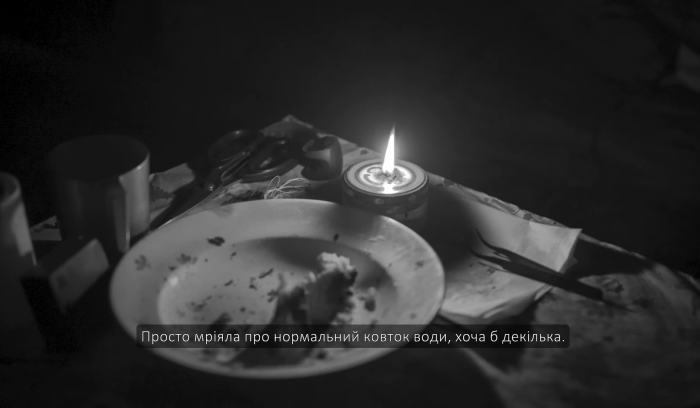
Still from Voices of Mariupol
The Kyiv Independent will present When the Water Screams, an investigative film by Olesia Bida. Following the destruction of the Kakhovka Dam, the occupying authorities on the left bank of the Kherson region, along with Russian troops, neglected and obstructed the evacuation of civilians.
To reconstruct the events and understand what happened in the flooded areas of the left bank, the Kyiv Independent’s war crimes investigations team spoke with around fifty people—eyewitnesses, relatives of victims, and volunteers involved in rescue efforts. Their testimonies form the core of the investigation.
As a result of the dam’s destruction, the number of deaths in the occupied territories was several times higher than what Russia officially claims.
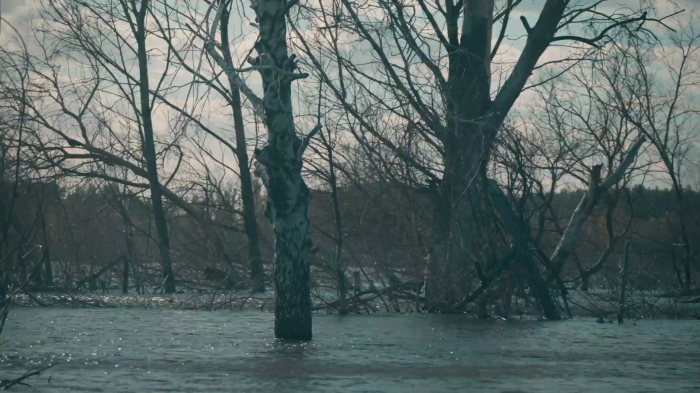
Still from When the Water Screams
The Grave, a film by Gwara Media, tells the story of the pursuit of justice and accountability in the year following the discovery of a mass grave in the autumn of last year, in a forest near the city of Izium in northeastern Ukraine. The discovery came after six brutal months of Russian occupation in 2022. Nearly 450 bodies were found—some had been tortured, others executed, and many killed by relentless shelling in the area.
While the families and loved ones of the victims seek justice for what appear to be war crimes, others are still searching for missing relatives — fearing they may be among the dead.
Part of the BAFTA-winning Exposure series, the film combines harrowing testimonies from survivors of the occupation with exclusive access to Ukrainian investigators and intelligence officers tracking down the Russians believed to be responsible for the atrocities.
As one of them said: “What the Russian military did is a crime against humanity. You could call it genocide.”
![]()
Still from The Grave
In April 2022, after Russian forces withdrew from the Kyiv region, the world was confronted with harrowing images from the Zhytomyr Highway. Dozens of Ukrainian civilians—mostly Kyiv residents—had attempted to flee westward along this road to escape the bombardment of the capital and its suburbs. Meanwhile, Russian troops had established positions along the highway and opened fire on passing vehicles. In those days, dozens of Ukrainians—men, women, and children—were killed on the Zhytomyr Highway.
In March 2022, 45-year-old Oleksandr Stepanechko was driving from Kyiv to Irpin to deliver the keys to his two cars to the local territorial defence forces. But he never made it. Ten days later, his family was forced to identify the charred remains of his body—Oleksandr had been shot in the head by occupying forces.
Slidstvo.Info, in its documentary Executed: The Story of a Man Who Tried to Get Home, reconstructs the events of that day step by step and reveals the circumstances of Oleksandr Stepanechko’s death. Journalists obtained exclusive audio intercepts, photographs, and videos, as well as testimony from a Russian officer who had been stationed on the Zhytomyr Highway—and who knows which of his fellow soldiers may have carried out the shooting.
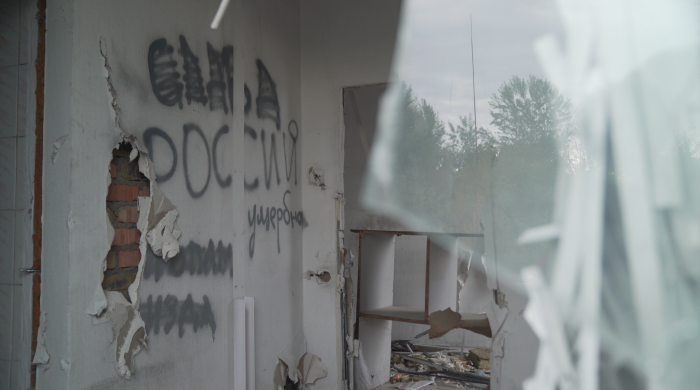
Still from Executed: The Story of a Man Who Tried to Get Home
As part of the non-competitive programme, audiences will have the opportunity to engage with the film teams during Q&A sessions held after each screening.
Additionally, on 9 June, within the framework of the RIGHTS NOW! human rights programme, a discussion will take place bringing together documenters, journalists, and human rights defenders—the authors of the films featured in the non-competitive programme UKRAINE WAR ARCHIVE/EVIDENCE. The conversation will explore today’s challenges, shifts in motivation and the realities of documenting the war, as well as the search for meaning in this work after three years of full-scale invasion.
Speakers:
Anna Babinets, Founding Editor of Slidstvo.Info;
Dmytro Dzhulai, Investigative Journalist at Radio Svoboda, Director;
Yevheniia Motorevska, Head of the War Crimes Investigations Unit at The Kyiv Independent;
Serhii Prokopenko, Editor-in-chief at Gwara Media;
Tatiana Symon, Interviewing Department Manager at the Ukraine War Archive, director.
Moderator: Viktoriia Hubarieva, Environmental Journalist at the solutions media outlet Rubryka.
Zhovten Cinema, Dolce Vita Hall
26 Kostyantynivska St.
9 June, 14:00
Admission is free
A reminder that during the festival, the Ukraine War Archive Viewing Room will be open to all those interested in learning more about the database of over 37 million records, as well as Lenses—a tool designed to enable fast and effective work with open-source materials.
Zhovten Cinema, Seans Hall
Opening hours: 7–12 June, 12:00–20:00
Festival guests are also warmly invited to visit the LAB: DOCU/SYNTHESIS x Ukraine War Archive exhibition, along with special events, discussions, and artist talks as part of this year’s DOCU/SYNTHESIS programme. More details on the schedule and programme can be found at the link.